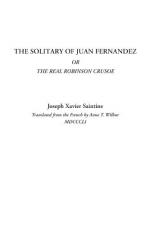Alexander Selkirk,—the name of the principal personage in this narrative,—was born at Largo, in the county of Fife, not far from St. Andrew. Entered as a pupil in the university of the town, he at first distinguished himself by his aptitude and his intelligence, until the day when, hearing of the beauty of the landlady of the Royal Salmon, he was seized with an irresistible desire to see her: he saw her, and became violently enamored. It was one of those youthful passions, springing rather from the effervescence of the age, than from the merit of the object; one of those sudden ebullitions to which the young recluses of science are sometimes subject, from a prolonged compression of the natural and affectionate sentiments.
From this moment, all the words in the Greek and Latin dictionaries, all the principles of natural philosophy, mathematics and history, suddenly taken by storm, whirled confusedly and pell-mell in the head of Selkirk, like the elements of the world in chaos, before the day of creation.
His professors had predicted that at the annual exhibition he would obtain six great prizes; he obtained not even a premium.
As a punishment, he was required to remain within the college grounds during the vacation. But its gates were not strong enough, nor its walls high enough to detain him.
Condemned, for the crime of desertion, to a classic imprisonment, he was shut up in a cellar; he escaped through the window; in a garret; he descended by the roof.
Then, pronounced incorrigible, he was expelled from the university.
He left it joyous and happy, escaped from the tutor commissioned to conduct him to his father, and at last wholly free, his own master, he took lodgings in a cabin, not far from the Royal Salmon, and thought himself monarch of the universe.
As soon as the doors of the inn were opened, he penetrated there with the earliest fogs of morning, with the first beams of day; in the evening he was the last to cross the threshold, after the extinction of the lights.
All day long, seated at a little table opposite the bar, between a pipe and a pewter pot, he watched the movements of Kitty, and followed her with admiring eyes.
Catherine was not slow to perceive this new passion; but she was accustomed to admiring eyes, and therefore paid but little heed to them. She was then at the age of twenty-two, in all the glory of her transient royalty; he, scarcely sixteen, was in her eyes a boy, a raw and awkward boy, like almost all the other students, and she contented herself with now and then bestowing a slight smile upon him, in common with her other customers.
But this mechanical smile, this half extinguished spark, did but increase the flame, by kindling in the young man’s soul a ray of hope.
At this age, passion has not yet an oral language; it is in the heart, in the head especially, but not on the lips; one comprehends, experiences, dreams, writes of love in prose and verse, but does not talk of it. Selkirk had twenty times attempted to confess his affection to Catherine; he had as yet succeeded only in a few simple and hasty meteorological sentences, on the rain and fine weather. He therefore wrote.




